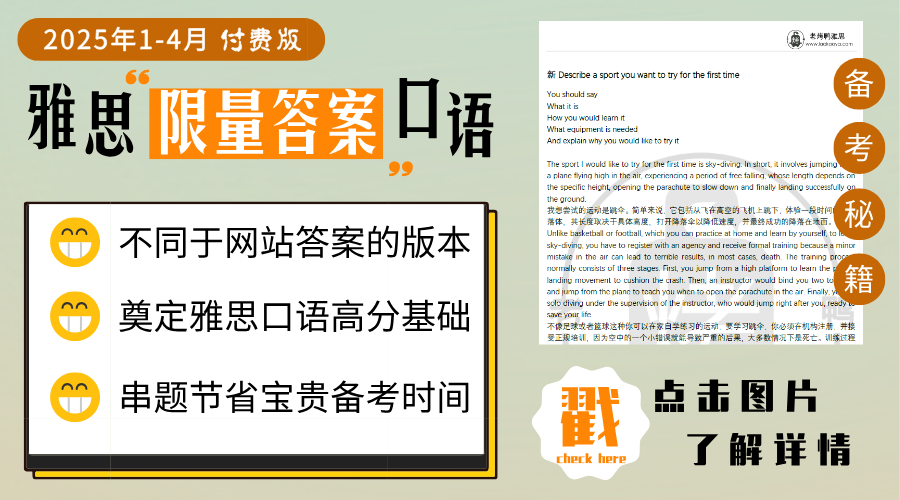剑桥雅思10Test4Section3听力原文与答案 work placement
剑桥雅思10听力第四套题目第三部分的主题为两名学生讨论实习的收获以及申请流程,由两道5选2的多选和6道匹配题构成。整体来看,题目难度不算太大,不过后面的匹配部分几乎每道题目都设置了干扰项,需要大家耐心一些。
点击查看这篇雅思听力中需要大家掌握的重点词汇与具体题目的答案解析:
雅思备考听力篇 剑10 test 4 section 3 雅思听力高频词汇
剑桥雅思10Test4听力Section3答案解析 Laura‘s work placement
剑桥雅思10 test4 section3雅思听力原文
TIM: Hi, Laura—could you spare a few minutes to talk about the work placement you did last summer? I’m thinking of doing one myself…
LAURA: Hi, Tim. Sure.
TIM: Didn’t you do yours at an environmental services company?
LAURA: That’s right… It’s only a very small company and they needed someone to produce a company brochure, and I wanted to get some business experience because I’m interested in a career in occupational psychology in a business environment. It was good because I had overall responsibility for the project.
TIM: What kind of skills do you think you developed on the placement? I mean, apart from the ones you already had.. Did you have to do all the artwork for the brochure, the layout and everything?
LAURA: We hired the services of a professional photographer for that. I did have to use my IT skills to a certain extent because I cut and pasted text from marketing leaflets, but that didn’t involve anything I hadn’t done before.
TIM: Do you think you got any better at managing your time and prioritising things (Q21)? You always used to say you had trouble with that…
LAURA: Oh, definitely. There was so much pressure to meet the project deadline. And I also got better at explaining things and asserting my opinions (Q22), because I had to have weekly consultations with the marketing manager and give him a progress report.
TIM: It sounds as if you got a lot out of it then.
LAURA: Absolutely. It was really worthwhile … But you know, the company benefited too…
TIM: Yes, they must have done. After all, if they’d used a professional advertising agency to produce their brochure instead of doing it in-house, presumably they’d have paid a lot more?
LAURA: Oh, yes. I worked it out—- it would have been 250 per cent more (Q23). And I thought the end result was good, even though we did everything on site. The company has quite a powerful computer and I managed to borrow some scanning software from the university. The new brochure looks really professional; – it enhances the image of the company straight away (Q24).
TIM: So in the long run it should help them to attract clients, and improve their sales figures?
LAURA: That’s the idea. Yeah.
TIM: Well, all in all it sounds very positive — I think I will go ahead and apply for a placement myself. How do I go about it?
LAURA: It’s easy enough to do, because there’s a government agency called STEP- S-T-E-P – that organises placements for students. You should start by getting their booklet with all the details—I expect you can download one from their website.
TIM: Actually, they’ve got copies in the psychology department (Q25) —I’ve seen them there, I’ll just go to the office and pick one up.
LAURA: Right. And then if I were you, after I’d looked at it I’d go over all the options with someone…
TIM: I suppose I should ask my tutor’s advice. He knows more about me than anyone.
LAURA: One of the career officers would be better (Q26), they’ve got more knowledge about the jobs market than your personal tutor would have.
TIM: OK…
LAURA: And then when you know what you want you can register with STEP—you’ll find their address in the booklet. And once you’ve registered they assign you to a mentor who looks after your application.
TIM: And then I suppose you just sit back and wait till you hear something?
LAURA: They told me at the careers office that it’s best to be proactive, and get updates yourself by checking the website for new placement alerts (Q27). Your mentor is supposed to keep you informed, but you can’t rely on that.
TIM: I don’t suppose it’s a good idea to get in touch with companies directly, is it?
LAURA: Not really… But it is the company who notifies you if they want you to go for an interview. You get a letter of invitation or an email from personnel departments (Q28).
TIM: And do I reply directly to them?
LAURA: Yes, you do. STEP only gets involved again once you’ve been made a job offer.
TIM: Right… So, once you’ve had an interview you should let your mentor know what the outcome is (Q29)? I mean whether you’re offered a job, and whether you’ve decided to accept it?
LAURA: That’s right. They’ll inform the careers office once a placement has been agreed, so you don’t have to do that.
TIM: Is that all then?
LAURA: More or less. Only once you’ve accepted an offer you’ll probably have to supply a reference, because the placement will be conditional on that. And that’s something you should ask your own tutor to provide (Q30). He knows about your academic ability and also about your qualities, like reliability.
TIM: Well, thanks very much for the information—I’m starting to look forward…
剑桥雅思10 Test4 Section3雅思听力答案
21-22. AE
23-24. BC
25. D
26. F
27. G
28. B
29. E
30. C
剑桥雅思10Test4Section1听力原文与答案 Thorndyke’s builders
剑桥雅思10Test4Section2听力原文与答案 Manham Port
剑桥雅思10Test4Section4听力原文与答案 Nanotechnology


